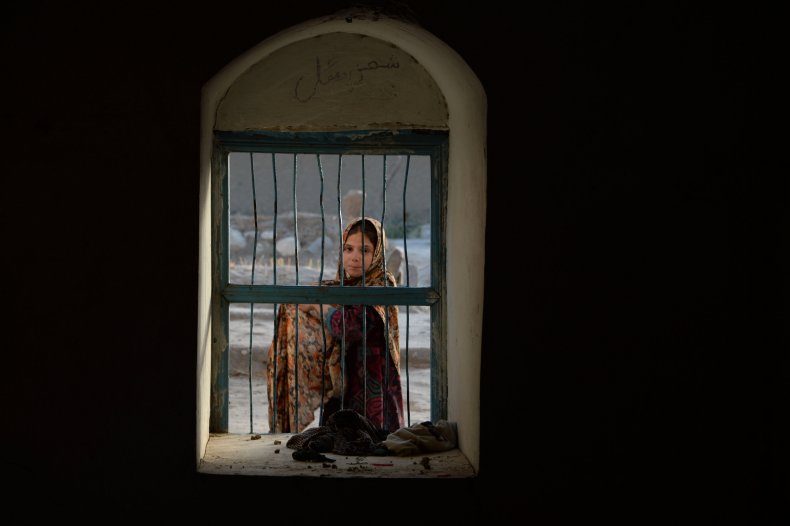
Afghanistan Needs Global Support to Stop Violence Against Women | Opinion
Original link found here.
, Chief of Global Programs, Every Woman Treaty
I lived in Afghanistan under Taliban rule.
Like so many, I lost family members to assassinations, in my case my father and brother. Despite the oppression of women in my country, my family always supported my education, and I was motivated to study law to try to bring about justice.
Even with tremendous obstacles and judgement, I succeeded in becoming the first female judge in my home province of Parwan. Yet I was still forced to make rulings that I didn’t agree with, due to local law. In addition, with no man at home, under Taliban rule I was forced to pay our neighbors so that their young son could accompany me if I needed to leave the house. I was a highly educated judge and attorney who made important decisions and applied the law, but I was also considered so low in society I had to rent a 4-year-old boy just to go out and buy groceries.
Under Taliban rule, women accused of breaking such restrictions faced harsh, sometimes capital, punishment, often in public. Even with international condemnation, these retributions still happen, and they will likely grow more frequent without a unified effort to stop them. My own work as an outspoken women’s rights advocate ultimately forced me to flee for my life.
As U.S. withdrawal from Afghanistan moves toward completion, so does the return to a country rife with oppression and violence against women. The gradual resurgence of the Taliban has meant threats and brutality are on the rise, and without the presence of Western troops, the need for global accountability becomes vital.
Since February 2020, more than 400 women have been targeted and killed in Afghanistan, mostly at the hands of the Taliban. Two of them were fellow judges that I worked with at the Supreme Court in Kabul, gunned down on their way to work.
This pivotal moment of transition for my home country comes as millions around the world are also experiencing what many are calling the shadow pandemic of violence against women and girls. According to the World Health Organization, one in three women globally experience physical or sexual violence in their lifetime. This must end.
Fortunately, the United Nation’s Generation Equality Forum is approaching, and lists gender-based violence at the top of their priorities. In anticipation, I along with more than 260 other women’s rights activists from 64 countries have written a public letter to the Forum leaders, urging them to consider a global treaty to end violence against women and girls as an important solution. Policy changes, investments and partnerships to eliminate gender-based violence are all also critical, but not enough.
There are regional treaties to end violence against women and girls, and an international agreement against discrimination, but there is nothing overarching, explicit, binding and up-to-date to address violence specifically. Clearly, whatever we currently have is not working.
“For far too long, women’s rights activists like ourselves have shouldered the burden of responding to violence against women in the face of huge obstacles, and to the best of our abilities,” says our letter. “In doing so, we put our own lives on the line each and every day. … This is not about one country telling another country what to do. This is about nations coming together to take a stand on ending violence against women and girls once and for all.”

Women’s rights activists in the U.K. and Mexico have been brutally beaten and abused by police; or labeled “foreign dissidents” in Russia. In South Sudan, the government has threatened to reinstate public order laws that make it illegal for women to protest. In the United States, the Interior secretary is investigating why so many Indigenous women are going missing. Every country has too many examples.
A global treaty would mandate training and accountability for police officers, judges and health professionals, increase funding for survivor services such as shelters, hotlines and legal aid and require violence prevention education so that such incidents don’t occur in the first place. Most of all, it would hold nations accountable to each other, despite cultural or religious differences.
It gives me chills to think about Afghanistan returning to an era much like before U.S. and allied troops arrived. Though threats have still existed, over the last two decades conditions for women have improved greatly.
Afghanistan now has 3.5 million girls enrolled in school, and as of last year, 21 percent of civil servants and 27 percent of parliamentarians are women. Even life expectancy has increased among women. All of this progress, which started from zero under Taliban rule, will vanish after U.S. troop withdrawal. Instead of moving forward, allowing more girls the freedom to go to school or simply to walk to the marketplace by themselves, we will move backwards.
Generation Equality has pronounced their goal to be “a permanent acceleration in equality, leadership and opportunity for women and girls worldwide.” This will not be achieved without ending violence against us. We need the entire planet to stand up and say no to these egregious acts.
“The right to be free from violence is a universal human right,” says our letter. “We cannot continue to put ourselves in harm’s way to help women one by one to solve this problem. This is not safe, scalable, or sustainable.”
A global treaty to end violence against women and girls will remind the government of Afghanistan, as well as governments around the world, that certain behaviors are unacceptable, and that the world is watching. For us, this is not a shadow pandemic, it’s the front-and-center pandemic of our time.
Judge Najla Ayoubi is the chief of global programs at Every Woman Treaty. She served as the senior state attorney at the Attorney General Office of Afghanistan, state attorney of the Parwan province and judge at the Parwan Provincial Court. She currently lives in Los Angeles.
